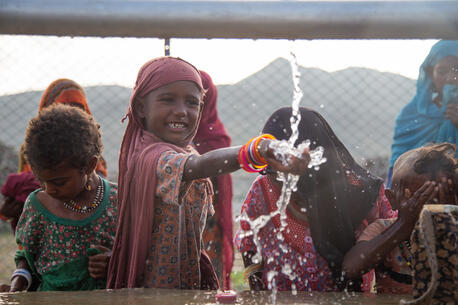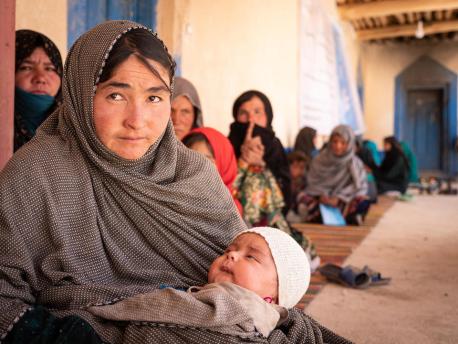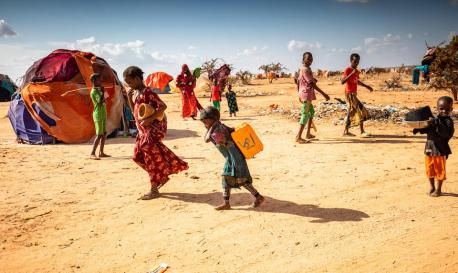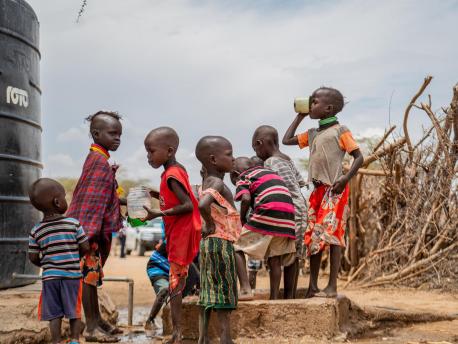
UNICEF-Supported Water Systems a Lifeline in Drought-Stricken Kenya
A dispatch from the front lines of the climate emergency unfolding in Kenya's Turkana County and across the Horn of Africa.
It has been years since the rainy seasons faded away in Kenya's Turkana County, destroying crops and livestock, and depriving families of their livelihoods and the drinking water they need to survive. Like others across the Horn of Africa, the people of Turkana County are living through the worst drought crisis in 40 years. Meanwhile, supply chains disrupted by the war in Ukraine have pushed the price of food out of reach for many, leaving children weak, malnourished and vulnerable to disease.
UNICEF USA President and CEO Michael J. Nyenhuis recently traveled to Turkana County with NBC Nightly News correspondent Keir Simmons to see firsthand how UNICEF and partners are providing humanitarian relief to families caught up in a climate catastrophe not of their own making. From improving water access to delivering immunizations and lifesaving Ready-to-Use Therapeutic Food, UNICEF won't stop until every child is safe and protected. Below, Nyenhuis shares scenes from the front lines of the climate crisis.
I’ve been around safe water projects for many years. Digging boreholes. Installing pumps. Repairing broken pumps (far too many are broken). Building bio-sand filters. Training community water committees to own, manage and maintain their local water source.
I’m still stunned at how beautiful clear, clean water looks, especially in parched places where water is scarce. It seems like a miracle, doesn’t it, when life-giving water bubbles up from the ground? Really, it is just good engineering.
Climate-resilient water systems installed by UNICEF use solar energy to power pumps protected by large concrete boxes with steel lids. © Michael J. Nyenhuis for UNICEF USA
Climate-resilient water systems sustain families, schools and health clinics
The water systems UNICEF is installing in drought-stricken northern Kenya are well engineered. We’re building “climate-resilient” water systems. The “resilient” part is that solar power drives pumps that are protected within large concrete boxes with steel lids. The “systems” part is that water is pumped into an elevated tank and distributed via pipes to multiple locations. These are not single, simple hand pumps. They are community water systems.
We saw one of these in the rural community of Sopel. The elevated water tank feeds one water source for local residents and a second for their animals. This alone is a significant contribution to hygiene and health in the community. Pipes also run to a nearby clinic and primary school — the first time either has had a steady supply of safe water.
We saw a second at Nabulon Primary School for Girls in the town of Lodwar. The water tank feeds a secondary tank on campus. It was exciting to see the girls twist the tap, fill their cups with cool, clear water and take long drinks. Pipes also feed water into the municipal water system that serves more than 10,000 people.
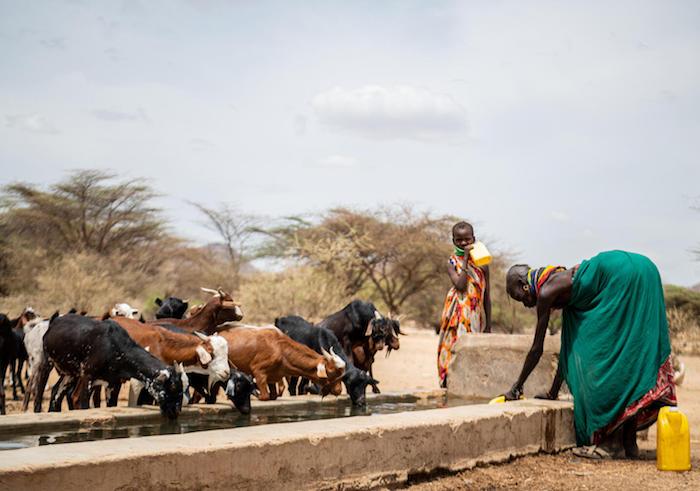
A woman fetches water from the community water trough in the village of Sopel, Turkana County, Kenya. UNICEF rehabilitated the solar-powered water system. © UNICEF/UN0727989/Wahome
Public/private partnerships help communities maintain reliable water access
Here’s an interesting partnership: The local Catholic diocese runs a water pump repair operation. Communities pay a small monthly fee to the diocese and can call for repairs anytime they are needed. The village of Sopel participates.
Here’s another one: Accessing the technical equipment needed to operate solar pumps was difficult because the only supplier was in distant Nairobi. The UNICEF team convinced that supplier there was business to be had in northern Kenya. The supplier opened an office in Lodwar, and now the equipment and spare parts are easily available to UNICEF and others.
We talk about advocating before governments; sometimes we have to do the same with the private sector.
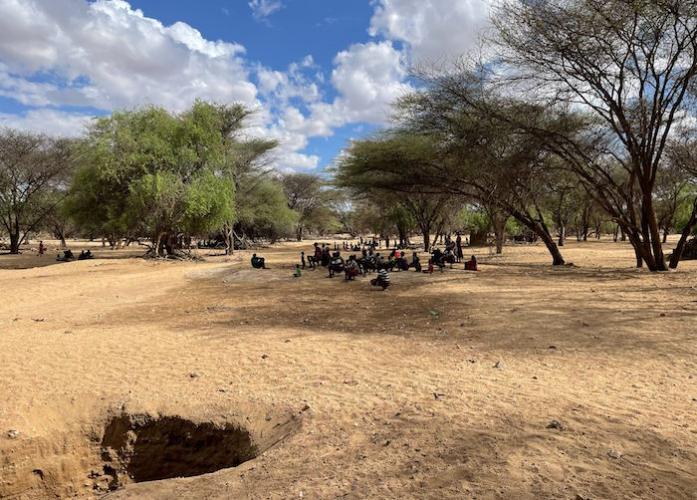
Deep holes dug in search of water dot the landscape surrounding the village of Lotong'wa in Turkana County, Kenya. The community is home to 3,500 residents; 20 percent are children under the age of 5. © Michael J. Nyenhuis for UNICEF USA
The search for water: deep hand-dug 'scoop holes' and bucket brigades
I learned a new term in Kenya and saw something I’d never seen before: “scoop holes.” In the small, rural community of Lotong’wa we saw many of them.
Lotong’wa is a pastoralist community. They raise goats. One day, the men take the goats to often distant grazing fields — something increasingly difficult to find as the impacts of the drought worsen. The next day, women make sure the animals get water. But how? There is no tap water in Lotong’wa, no proper borehole, no pump drawing up clean water, no stream or lake and no rains over the last many seasons now.
Instead, the people of Lotong’wa have dug deep holes in the ground all around their community. Some are 20 feet across at the top and drop 30 to 45 feet before hitting groundwater. To fetch that water, as many as a dozen women climb down inside to create what amounts to a bucket brigade. A person at the bottom scoops water into a bucket and passes it up via a chain of women poised on dirt ledges on the sides of the hole. A scoop of water. A big hole. A scoop hole.
Though not plentiful, the water keeps the people and animals of Lotong’wa alive in the midst of the drought. Though not particularly clean, it is what they have. Though not always safe — from time to time the holes collapse; a women died there recently — they have no choice.
Schoolchildren in Lodwar, in northern Kenya's Turkana County, with UNICEF USA President and CEO Michael J. Nyenhuis. © UNICEF Kenya
UNICEF and partners provide health outreach camps nearby from time to time to vaccinate children and screen for and treat those who are malnourished. The country office has looked at what it would take to bring a climate resilient water system — protected borehole, solar-powered pump and distribution system—to Lotong’wa. It is very expensive for one small community — maybe $100,000.
I don’t know. If I had $100K to spare, I’d think about it to keep women out of the scoop holes, provide safe water to the kids and help their goat herds flourish.
TOP PHOTO: Pupils of Sopel Primary School in Turkana County, northern Kenya, collect drinking water from a water point at school. UNICEF has rehabilitated the solar-powered water system, which also serves the community garden, kitchen and health facility. © UNICEF/UN0727995/Wahome
